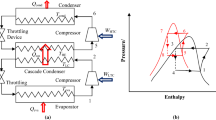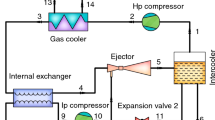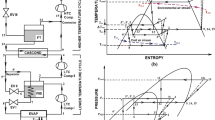Abstract
This work investigates an exhaust heat-driven ejector refrigeration system with the thermo-economic considerations. The system is thermally modelled and is optimized considering the performance coefficient and the total annual cost as two objectives using heat transfer search algorithm. Generator temperature, evaporator temperature and condenser temperature are considered as design variables. A 2-D shock circle model is used to simulate the ejector component with R245fa refrigerant. The results of multi-objective optimization are discussed using the Pareto frontier obtained between both conflicting objective functions. The effect of varying the nozzle throat diameter and the ecological function on the thermo-economic objectives is presented and discussed. The sensitivity analysis of the objective functions to the decision variables is investigated. Further, the exergo-economic results at the optimal point are also presented and discussed. The results reveal that the ejector and the generator are the leading contributors to the exergy destruction and hence to the total annual cost. The coefficient of performance and total annual cost at the best optimal point are 0.3 and 25,903 $/year, respectively. The optimized product unit cost of the system is 53.8 $/GJ with 10.5% exergy efficiency.
Graphic abstract










Similar content being viewed by others
Abbreviations
- A :
-
Area (m2)
- \(C_{{\text{p}}}\) :
-
Specific heat (J/kg K)
- COP:
-
Coefficient of performance (–)
- CRF:
-
Capital recovery factor (year−1)
- \(\dot{C}\) :
-
Exergy cost rate ($/year)
- \(\dot{C}_{Q}\) :
-
Exergy cost rate associated with heat transfer ($/year)
- \(\dot{C}_{W}\) :
-
Exergy cost rate associated with work transfer ($/year)
- D :
-
Diameter (m)
- \(\dot{E}\) :
-
Exergy rate (W)
- h :
-
Specific enthalpy (J/kg K)
- H :
-
Pump energy head (m)
- M :
-
Mach number (–)
- MF:
-
Maintenance factor (–)
- \(\dot{m}\) :
-
Mass flow rate (kg/s)
- N :
-
Velocity distribution exponent (-)
- P :
-
Pressure (Pa)
- \(\dot{Q}\) :
-
Heat transfer rate (W)
- R :
-
Radius (m)
- \(R_{{{\text{gas}}}}\) :
-
Gas constant (J/kg K)
- s :
-
Specific entropy (J/kg K)
- T :
-
Temperature (K)
- TAC:
-
Total annual cost ($/ywar)
- u :
-
Unit cost ($/GJ)
- v :
-
Specific volume (m3/kg)
- V :
-
Velocity (m/s)
- \(\overline{V}\) :
-
Mean velocity (m/s)
- \(\dot{W}\) :
-
Work transfer rate (W)
- Z :
-
Component cost value ($)
- \(\dot{Z}\) :
-
Component cost rate ($/year
- \(\eta\) :
-
Efficiency
- \(\eta_{{{\text{s}},{\text{p}}}}\) :
-
Pump isentropic efficiency
- \(\eta_{{{\text{m}},{\text{p}}}}\) :
-
Pump mechanical efficiency
- Γ :
-
Adiabatic index
- Cr:
-
Condenser
- Evap:
-
Evaporator
- g:
-
Generator
- p:
-
Primary flow
- s:
-
Secondary flow
- d:
-
Diffuser
- D:
-
Destruction
- F:
-
Fuel
- t:
-
Nozzle throat
- \(e1\) :
-
Primary nozzle exit
- \(e2\) :
-
Constant area section
- pa:
-
Primary flow at a–a
- sa:
-
Secondary flow at a-a
- m:
-
Mixed flow
- i, in:
-
Inlet
- e, ex:
-
Exit
- O:
-
Reference state
- K:
-
Component
- ECF:
-
Ecological function
- HTS:
-
Heat transfer search
- IC:
-
Internal combustion engine
References
Ahmadi MH, Ahmadi MA, Mehrpooya M, Hosseinzade H, Feidt M (2014) Thermodynamic and thermo-economic analysis and optimization of performance of irreversible four-temperature-level absorption refrigeration. Energy Convers Manag 88:1051–1059
Chen W, Liu M, Chong D, Yan J, Little AB, Bartosiewicz Y (2013) A 1D model to predict ejector performance at critical and sub-critical operational regimes. Int J Refrig 36(6):1750–1761
Chen J, Havtun H, Palm B (2014) Investigation of ejectors in refrigeration system: optimum performance evaluation and ejector area ratios perspectives. Appl Therm Eng 64(1–2):182–191
Chunnanond K, Aphornratana S (2004) Ejectors: applications in refrigeration technology. Renew Sustain Energy Rev 8(2):129–155
Dai Y, Wang J, Gao L (2009) Exergy analysis, parametric analysis and optimization for a novel combined power and ejector refrigeration cycle. Appl Therm Eng 29(10):1983–1990
Eldakamawy MH, Sorin MV, Brouillette M (2017) Energy and exergy investigation of ejector refrigeration systems using retrograde refrigerants. Int J Refrig 78:176–192
Gil B, Kasperski J (2015) Efficiency analysis of alternative refrigerants for ejector cooling cycles. Energy Convers Manag 94:12–18
Huang BJ, Chang JM, Wang CP, Petrenko VA (1999) A 1-D analysis of ejector performance. Int J Refrig 22(5):354–364
Jaluria Y (2007) Design and optimization of thermal systems. CRC Press, Boca Raton
Lazzaretto A, Tsatsaronis G (2006) SPECO: a systematic and general methodology for calculating efficiencies and costs in thermal systems. Energy 31(8–9):1257–1289
Liu J, Wang L, Jia L (2017) A predictive model for the performance of the ejector in refrigeration system. Energy Convers Manag 150:269–276
Misra RD, Sahoo PK, Sahoo S, Gupta A (2003) Thermo-economic optimization of a single effect water/LiBr vapours absorption refrigeration system. Int J Refrig 26(2):158–169
Narimani E, Sorin M, Micheau P, Nesreddine H (2019) Numerical and experimental investigation of the influence of generating pressure on the performance of a one-phase ejector installed within an R245fa refrigeration cycle. Appl Therm Eng 157:113654
Patel VK (2018) An efficient optimization and comparative analysis of ammonia and methanol heat pipe for satellite application. Energy Convers Manag 165:382–395
Patel VK, Raja BD (2019) A comparative performance evaluation of the reversed Brayton cycle operated heat pump based on thermo-ecological criteria through many and multi objective approaches. Energy Convers Manag 183:252–265
Patel VK, Savsani VJ (2015) Heat transfer search (HTS): a novel optimization algorithm. Inf Sci 324:217–246
Patel VK, Savsani VJ, Mudgal A (2017) Many-objective thermodynamic optimization of stirling heat engine. Energy 125:629–642
Raja BD, Jhala RL, Patel VK (2017) Many-objective optimization of cross-flow plate-fin heat exchanger. Int J Therm Sci 118:320–339
Sadeghi M, Mahmoudi SMS, Saray RK (2015) Exergoeconomic analysis and multi-objective optimization of an ejector refrigeration cycle powered by an internal combustion (HCCI) engine. Energy Convers Manag 96:403–417
Sanaye S, Emadi M, Refahi A (2019) Thermal and economic modeling and optimization of a novel combined ejector refrigeration cycle. Int J Refrig 98:480–493
Shestopalov KO, Huang BJ, Petrenko VO, Volovyk OS (2015) Investigation of an experimental ejector refrigeration machine operating with refrigerant R245fa at design and off-design working conditions. Part 1. Theor Anal Int J Refrig 55:201–211
Śmierciew K, Gagan J, Butrymowicz D, Karwacki J (2014) Experimental investigations of solar driven ejector air-conditioning system. Energy Build 80:260–267
Sokolov M, Hershgal D (1991) Enhanced ejector refrigeration cycles powered by low grade heat. Part 3. Experimental results. Int J Refrig 14(1):24–31
Surindra MD, Caesarendra W, Prasetyo T, Mahlia TMI (2019) Comparison of the utilization of 110 °C and 120 °C heat sources in a geothermal energy system using organic rankine cycle (ORC) with R245fa, R123, and mixed-ratio fluids as working fluids. Processes 7(2):113
Tashtoush B, Alshare A, Al-Rifai S (2015) Performance study of ejector cooling cycle at critical mode under superheated primary flow. Energy Convers Manag 94:300–310
Varga S, Oliveira AC, Palmero-Marrero A, Vrba J (2017) Preliminary experimental results with a solar driven ejector air conditioner in Portugal. Renew Energy 109:83–92
Wang JH, Wu JH, Hu SS, Huang BJ (2009) Performance of ejector cooling system with thermal pumping effect using R141b and R365mfc. Appl Therm Eng 29(10):1904–1912
Yan J, Cai W, Li Y (2012) Geometry parameters effect for air-cooled ejector cooling systems with R134a refrigerant. Renew Energy 46:155–163
Zhang Z, Tong L, Chang L, Chen Y, Wang X, Knuth KH (2015) Energetic and exergetic analysis of an ejector-expansion refrigeration cycle using the working fluid R32. Entropy 17:4744–4761
Zhu Y, Li Y (2009) Novel ejector model for performance evaluation on both dry and wet vapors ejectors. Int J Refrig 32(1):21–31
Zhu Y, Cai W, Wen C, Li Y (2007) Shock circle model for ejector performance evaluation. Energy Convers Manag 48(9):2533–2541
Author information
Authors and Affiliations
Corresponding author
Ethics declarations
Conflict of interest
The authors declare that they have no conflict of interest.
Additional information
Publisher's Note
Springer Nature remains neutral with regard to jurisdictional claims in published maps and institutional affiliations.
Rights and permissions
About this article
Cite this article
Mansuriya, K., Patel, V.K., Desai, N.B. et al. A performance evaluation of the ejector refrigeration system based on thermo-economic criteria through multi-objective approach. Clean Techn Environ Policy 23, 1087–1103 (2021). https://doi.org/10.1007/s10098-020-01884-1
Received:
Accepted:
Published:
Issue Date:
DOI: https://doi.org/10.1007/s10098-020-01884-1




